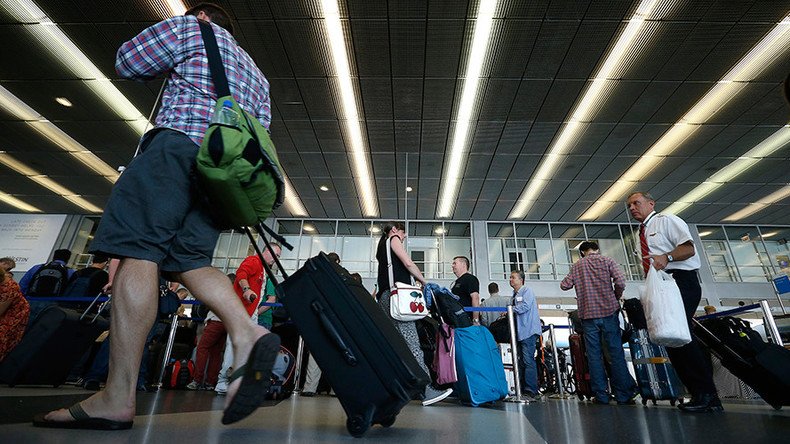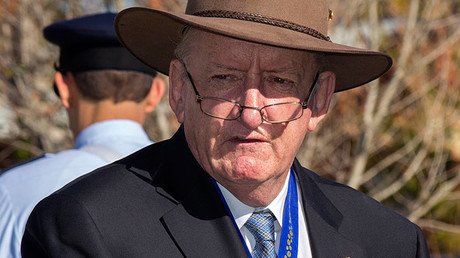Time to take a leaf out of State Dept’s book: Issue travel alert for the US

If the San Bernardino shootings had happened in any other country, you can bet your bottom dollar that the US State Department would have issued a travel alert for that country in the aftermath.
Travel cautions are ten a penny these days, but it’s practically unheard of to see an alert being made for the United States. That’s strange really when you consider that the country has suffered 355 mass shootings so far this year. Surely that would be enough to land any other country on a travel alert list, wouldn’t it?
The State Department generally issues two kinds of travel cautions. The first is the ‘Travel Alert’ which is issued for “short-term events we think you should know about when planning travel to a country”. That includes things like upcoming elections which could cause disruption, likelihood of protests, or an elevated risk of terrorism.
The second kind of caution is the more serious ‘Travel Warning’ which the department issues “when we want you to consider very carefully whether you should go to a country at all”. That covers countries experiencing civil war, frequent attacks against tourists, or “intense levels of crime or violence”.
The State Department’s travel advice can be important and useful. In addition to the warnings and alerts, they also publish “country information” for tourists to check before traveling — but frankly, sometimes it needs to be taken with a pinch of salt. If you took it all under consideration, you might never leave the comfort of your own living room.
After the November 13 terror attacks in Paris, the US issued a ‘worldwide travel alert’ for its citizens. Fair enough. But why are other countries so reluctant to warn their citizens about the very real threat to their safety that comes with travel to the US?
“It’s time to call out the USA”
Someone who’s not too happy about the double standard on travel alerts is Australia’s former deputy prime minister Tim Fischer. Fischer spoke to ABC News on Thursday and suggested that it was time Australia’s travel advice for the US reflected the threat of gun violence, the way it does for Mexico, for example.
Fischer, who led the charge for sweeping gun reform laws in Australia after the Port Arthur massacre in 1996, also criticized the National Rifle Association (NRA) for their “unacceptable blockage” of common-sense reforms.
"I'm a bit sick and tired of the US chucking handballs at us, putting into their travel advice that it's not safe to go to Sydney," he said, adding that a person was 15 times more likely to be shot dead in the US than Australia.
"It's time to call out the USA," he said.
And he is 100% correct. The US doles out travel alerts and warnings like they’re going out of style. It would be impossible to measure accurately the actual effect these have on tourism for cities like Sydney or Paris, but they surely have an impact.
"It's time to call out the USA" -- Australia's former deputy PM thinks a travel warning should be issued for the US https://t.co/1cnbg33CCZ
— Danielle Ryan (@DanielleRyanJ) December 4, 2015American exceptionalism
Most Westerners don’t consider the US a dangerous place to be — and for the most part, it’s not. But for the most part, Paris and Sydney are also safe places to be — and yet in the aftermath of terror attacks in these cities, we are warned of the danger, people cancel flights and there’s a general fear of travel to that location.
What is it about America — a country that experiences more mass shootings annually than days in the year — that makes us so reluctant to admit what is a glaringly obvious problem? Maybe it’s the size of the country which makes us feel like our chances of avoiding random incidences of gun violence are higher. Or maybe we’re trying not to offend? Are we afraid of some sort of rebuke? Do we now believe in American exceptionalism as much as some Americans do?
Whatever it is, it’s time we got over it.
Non-American westerners are inundated with constant propaganda messaging about the goodness and greatness of the US; the greatest country in the world, the coolest country in the world, the streets are paved with gold, etc. Maybe we’re just too brainwashed to accept the obvious.
Laughably, the UK’s foreign office lists the threat from hurricanes, forests and brush fires on its travel advice page about the US — but nothing about the threat from random gun violence. It also lists a “general threat” from terrorism — below the warning about brush fires, that is.
Ireland’s Department of Foreign Affairs advises travelers to the US that crime is “relatively low” but notes that the threat of terrorism has remained since the 9/11 attacks. Again, nada about the increasing frequency of mass shootings. Travelers are advised to take “normal precautions”. In contrast, the Irish DFA advises travelers to exercise “extreme caution” if traveling to France.
Even now that it’s been established that the San Bernardino attacks were ISIS-related terrorism, there are still no updated warnings.
A dangerous path
I have lived, studied and worked in the United States. In so many ways it is a great country. There is boundless optimism, a wonderful can-do attitude, innovative and creative people. But it is a society that increasingly feels as though it is living on a hair trigger. The slightest grievance or most minor provocation can turn into a full-blown aggressive conflict in a matter of seconds. An incident which would in most European countries be defused with some common-sense thinking and calm rationality can turn into a deadly nightmare in the US. There is a sense that people are permanently ready to pounce on each other for the most minor infraction.
Dear American Police.
Here is how to subdue a man with a huge knife without shooting or killing him. pic.twitter.com/VmeqhU4IV3
— Shaun King (@ShaunKing) December 4, 2015By the time I was leaving the US, in 2013, it was becoming harder to ignore the fact that even normal daily activities like going into a shopping mall or spending two hours in a cinema, brought with them some level of fear, even if it was tucked away at the back of your mind.
And that tucked-away fear had nothing to do with politically motivated terrorism — which is the source of anxiety in European cities today. Rather, more often than not, it’s the prospect of a lone wolf gunman who bought firearms, easily and legally, and was able to inflict horrific carnage in mere seconds; crimes which are often so preventable, and which lawmakers seem terminally unwilling to address.
It is a sad state of affairs — and baffling that we still can’t seem to admit it.
The statements, views and opinions expressed in this column are solely those of the author and do not necessarily represent those of RT.














